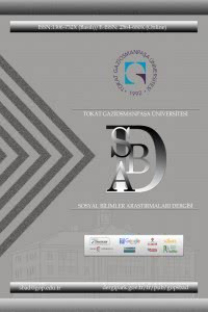Bilişsel Alışkanlık
Problem durumu: Yaşamda bazı davranışlar, uyarıcı davranım bağı kurularak ve bunlar pekiştirilerek öğrenilebilir. Uyarıcı gelince birey bunu otomatik olarak düşünmeden öğrenilen tepkiyi gösterebilir. Birey bir davranışı koşullama yoluyla öğrenir ve bu öğrenme sürekli desteklenir ve pekiştirilirse, ondan bu tür davranışı yapmaması istense bile, aynı uyarıcıya öğrendiği şekilde tepki verebilir. Araştırmanın amacı ve soruları: Genellikle saçma sorulardan oluşan bir sınava kesinlikle yanıt verilmeyecek denilse bile, öğrenciler yine de soruları yanıtlıyorlar mı? Sınıf düzeyi ve cinsiyet değişince, tepki değişiyor mu? Yöntem: Bu araştırmada, nicel ve nitel araştırma yönteminin odak grup görüşmesi kullanılmıştır. Bulgular: İlköğretim öğrencilerinin bulundukları sınıf ve cinsiyetlerinin sınavla ilgili bilişsel alışkanlıkları anlamlı derecede etkilemediği söylenebilir. Bu bağlamda bilişsel alışkanlıklar insanın ön öğrenmeleriyle, pekiştireç ve tekrarla, uzun süreli bellekle ve beyin temelli öğrenme yaklaşımlarıyla açıklanabilir. Öneriler: Bu konuda deneysel araştırmalar yapılabilir. Kişiler bilimsel yaklaşım eğitiminden geçirilerek, bunun etkileri araştırılabilir. Öğrencilerin kişilik gelişimine bilişsel alışkanlıkların etkisi incelenebilir
Anahtar Kelimeler:
Bilişsel alışkanlık, sınav, cinsiyet ve sınıf
Cognitive Habit
Status of the Problem: In life, some behavior can be learned with connecting responsive behavior and reinforcing these. Person may act the pre-learned response automatically, without thinking, when a stimulus comes. Person learns a behavior with conditioning and if this learning process is reinforced continuously, even if it is not wanted to do that kind of behavior, may response same kind of stimulus as it was learned. Purpose and questions of the study: Do students still answer the questions even if it is strictly told to don’t answer the questions of an exam consisting silly questions? Does the response change with class level and sex? Method: Both qualitative and quantitative approaches, qualitative survey method and focus group discussion technique are used together. Findings: It can be said that, the class and sex of elementary education students don’t affect the cognitive habits related to the exam meaningfully. In this manner, cognitive habits may be explained with the pre-learning, reinforcement and practice, long term memory and brain based education. Suggestions: Experimental research can be done on this subject. Scientific approach education may be applied to people in order to research the effects
Keywords:
Cognitive habits, exam, sex and class,
___
- Bloom, B.S. (1976).Human characteristics and school learning. New York, Hold Reinhart and Wiston.
- Demirel, Ö. (2006). Öğretimde planlama ve değerlendirme. Öğretme sanatı. Ankara,PEGEM.
- Gagne, R. M. (1988). The conditions of learning. New York, Hold Reinhart and Wiston.
- Gagne, R. M. and Briggs, L. J. (1979).Principles of instructional design. New York, Hold Reinhart and Wiston.
- Gözütok, F.D. (2006). Öğretim ilke ve yöntemleri. Ankara, Ekinoks.
- Küçükahmet, L. (2001).Öğretim ilke ve yöntemleri. Ankara, Nobel.
- Senemoğlu, N. (2008).Gelişim, öğrenme ve öğretim. Ankara.
- Sönmez, V. (2007). Program geliştirmede öğretmen elkitabı. Ankara, Anı yayıncılık.
- Sönmez (2008a). Gelecekteki olası eğitim sistemleri. Ankara, Anı Yayıncılık.
- Sönmez, V. (2008b). Bilim felsefesi. Ankara, Anı Yayıncılık.
- Yıldıran, G. (1982). Öğrenme düzeyi ve erişi. İstanbul.
- ISSN: 1306-732X
- Yayın Aralığı: Yılda 2 Sayı
- Başlangıç: 2006
- Yayıncı: Gaziosmanpaşa Üniversitesi Sosyal Bilimler Enstitüsü
Sayıdaki Diğer Makaleler
Belediye Başkanları Gözüyle Yerel Yönetim Sorunları
Fatih YÜKSEL, Osman ÇEVİK, Kadir ARDIÇ
Arif Melikov Yapıtları Türkiye Sahnesinde
Türk Siyasal Elitlerin Sosyal Profillerinin İncelenmesi (1950- 1960)
Şeyhmus DEMİR, Mutlu SESLİ, Emine DURSUN
Okul Müdürlerine Göre İlköğretim Okullarının SWOT(GZFT) Analizi
